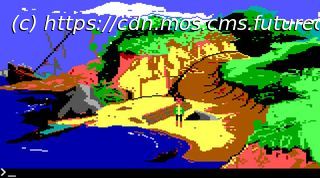It’s the work of a dedicated fan named Brandon Kouri.
In the early 1980s, Sierra was at the forefront of the move from text adventures to adventures of the graphical kind—first with Mystery House, and later a string of games made in the studio’s own Adventure Game Interpreter, like the first King’s Quest and its immediate sequels. AGI allowed for sound effects, music, and 16-color vector graphics, depicting protagonists who moved around scenes with the arrow keys. You still had to type “lift plank” and “get ring” to interact with things, but you had something nice to look at in addition to the paragraph of text you’d get by typing “look” in each new location.
AGI’s heyday lasted until 1988 when it was replaced by the Sierra Creative Interpreter, an updated scripting language that would eventually allow for hundreds of colors and digitized voice in games like King’s Quest 6. Generally considered the best of the series, King’s Quest 6 does still have a few dead ends you won’t immediately know you’ve blundered into by not talking to a certain person or picking up the right object at the right time—an unfortunate hallmark of the series—but there are less of them overall. If you fondly remember one King’s Quest game from your youth, this is probably the one.
Brandon Kouri’s introduction to videogames were King’s Quest 5 through 7, as well as Myst, which he played with his dad and sister. It was only when he decided to go back to the series’ beginnings that he saw AGI with its distinctively large pixels and power-walking characters. “I was enthralled by it”, Kouri says. “Something about it really sparked something in me, and I wanted to know everything about it and how it worked.”
There’s definitely a different vibe to each era of the adventure game. When I replay Quest for Glory: So You Want to Be a Hero I’m as likely to go back to the EGA original as the VGA remake—not just for the simpler graphics, but for the increased options a parser interface gives over more modern pointing and clicking.






